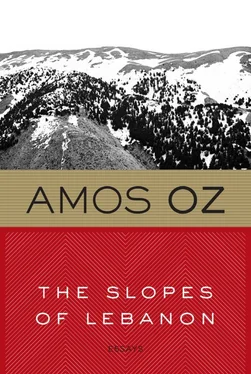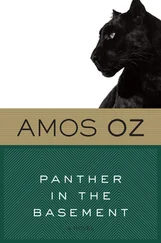I observe these phenomena from within the State of Israel. To be more precise, from Kibbutz Hulda, located in the coastal plain.
I am in favor of dividing the Land of Israel between its two peoples, and so is Kenan. But my motive is not to save the biblical character of Judea and Samaria from the perils of Formica and wallpaper. I admit it: I think there are things more beautiful than barren, rocky slopes, although I would be happy if at least some of them remained.
The title of this evening’s symposium, “How to Return to the Land of Israel,” is not entirely clear to me. We are in the Land of Israel. This basement, here in a high-rise building in Tel Aviv, is also the Land of Israel. The Formica fields are also the Land of Israel. Just as “Savings and Loan Village,” Building 3, or Housing-Plan 8, or Workers’ Co-op City 13 are the Land of Israel. Unless the hidden intention tonight is to present the Land of Israel in contradistinction to the State of Israel in order to negate the State of Israel. And maybe this is the covert common denominator that unites Mr. Kenan, General Yaffe, and Ms. Shemer. Now if they were negating it in the name of some visionary paragon, it would be understandable. But they are negating it in the name of sentimental exoticism.
If, in many respects, Israel is becoming more and more like the Jewish diaspora, I think that no Jewish settlement in the West Bank will restore its “youth” or its “Israeliness.” Certainly the areas whose character is Palestinian will not give it a biblical dimension. As long as the diaspora dictates their priorities and tastes, Israelis will take the diaspora with them wherever they go. In order to free ourselves from it, there is no point in turning our gaze to “unsullied,” “uncorrupted” geographic regions, because the issue is not one of space. In this respect, Kenan is right and his words are true and important: one builds his home and his garden according to his personality. I would say according to his mentality, but only Arabs have a “mentality.” Or else a person builds his home and his garden according to the shape of his dreams and his yearnings. If he is dreaming of America, then he will build America everywhere he goes, in every landscape. Actually, he will not build America, but a fantasy of what his imagination perceives America to be, unrelated to the real America. He will furnish his room in this manner, no matter whether it is on a mountain in Samaria or on a mountain overlooking the Jezreel Valley. The rocky mountain will take on the likeness of its inhabitants despite the archeological digs, the biblical memories, and the remnants of antiquity.
There is also a reverse process: The individual is shaped by his environment; man is shaped by climate, flora, and landscape. But this process, unlike the other, is measured in hundreds of years, not in terms of a generation or two.
Archeological digs have little to say to me, even though roots in the past are important to me. Which past? Which roots? My mother and father, my grandparents — what happened before their time fascinates me in books, not in physical artifacts. For me, the Land of Israel of the distant past is in books, not in shards. After reading the words of the prophets, the adventures of the kings, the Song of Songs, what can shards add? It is as though, after I had read Dostoevsky, someone were to bring me a matchbox from St. Petersburg. By the way, the shard and the matchbox can, of course, help to illustrate continuity or to arouse the imagination, but they do not have the power, by themselves, to arouse emotions — in me. In these times, I should also add the following: We must fight for the right of archeologists to conduct their digging, in the face of ultra-Orthodox opposition, unrelated to the subjective experiential weight of pottery shards. The words of the prophets are infinitely more important to me than the discovery of a prophet’s bones, or the unearthing of the stones our forefathers used to throw at the prophets. The hills of Samaria and Judea are places I would describe as “pretty,” “interesting,” “appealing,” if only they were not the arena of a terrible tragedy for two peoples today, if they were not filled today with hatred, injustice, and danger for everyone, inhabitants and occupiers alike. It is hard for me to describe such an arena of tragedy as “picturesque,” “esthetic,” or “touching.”
I can’t help it, I don’t always like the State of Israel, but sometimes I love it. In another, nontragic situation, I could perhaps find all kinds of picturesque biblical Arab villages on the West Bank esthetically appealing, but they are not me. And I am not enamored of them, not in the fashion of Ms. Shemer and not in the manner of General Yaffe or Mr. Kenan.
I would like the Jews here to change. That — yes. To become reconciled with themselves, with a history full of disaster, madness, and neurosis. To become a little reconciled with one another. Perhaps then, in the course of time, they will make peace with the place. Then, but only then, will the building, the house, the garden, the neighborhood, and the city be more content — in other words, more beautiful. As long as we don’t attempt to “reconstruct our lost childhood.” Neither our individual childhoods, of British Palestine, with ponytails and bobby sox and the pastoral fields of Jezreel, nor our collective childhood, with flocks of biblical sheep grazing on the slopes of biblical mountains. Because any such attempt is neurotic. And because no such attempt can succeed: What was once will not come again. Even if we want it awfully, terribly much. Even if we long for it endlessly. Hebron and Nablus will not be ours, whether or not the prophets once walked there, whether or not the stones our ancestors liked to throw at the prophets still lie scattered there. They will not be ours, and when they are not, it will be better for everyone.
We have to concentrate on the State of Israel, to want it and to put our efforts into it, to work on it and to struggle over its soul and shape. Perhaps it really will become slightly Mediterranean, more content, more relaxed, and a little more beautiful.
With that goal in mind, there is no point in going to war against the Formica and the wallpaper. To that end we have to change something inside ourselves. The change cannot be revolutionary, a change through a “bang.” It will be, if at all, a gradual and very slow change, since it will be, it seems, a very profound one.
There is no point in feuding with the State of Israel, crossing the Green Line to breathe the aroma of the Palestinian/biblical orchards and olive groves, of the mint and the hyssop, and then shut our eyes and declare, “I’ve reached the Homeland.” And there is certainly no point in saying, as Kenan does, “The State killed the Homeland for me.” For better or for worse, or even for worst, the State is the Homeland. Especially when, at last, after Kenan and I overcome Shemer and Yaffe and return the occupied territories to the Palestinians. Afterward, perhaps, we will try to change ourselves — if that is still possible.
Different version in Proza, February 1982
THE PEACE ON the agenda now is peace between Israel and Palestine led by the PLO (or perhaps by the PLO under a different name). Peace between Israel and Jordan, between Israel and “a Palestinian autonomy,” or between Israel and the West Bank Village League, is no longer relevant. It does not matter why it is no longer relevant, or whether or not this is a good thing, or whether or not such peace was ever relevant — presently the question of peace is between Israel and Palestine.
The Labor Party, under the leadership of Yitzhak Rabin, is incapable of endorsing peace between Israel and Palestine. As long as it is dominated by the ghosts of Golda Meir, Moshe Dayan, and Yisrael Galili, it is hard to see Labor freeing itself from policies that are no longer viable.
Читать дальше












